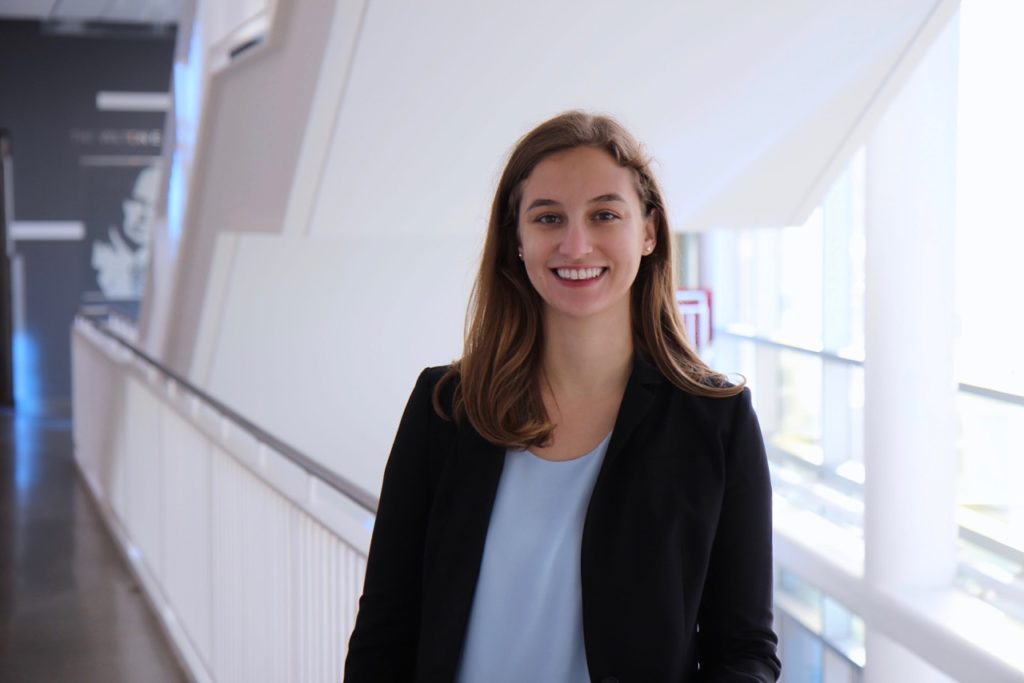By Sharon Adarlo
The Andlinger Center for Energy and the Environment at Princeton University has appointed two recent doctoral graduates to be the center’s first Distinguished Postdoctoral Fellows in Energy and the Environment.
Rebecca Ciez, who received her PhD in engineering and public policy from Carnegie Mellon this year, will be working on electric vehicle transportation and electricity generation technologies under the mentorship of Daniel Steingart, associate professor of mechanical and aerospace engineering and the Andlinger Center for Energy and the Environment, and Elke Weber, the Gerhard R. Andlinger Professor in Energy and the Environment and professor of psychology and public affairs. Bastien Wild, who received his PhD in Earth Science from the University of Strasbourg in 2017, will focus his research on the degradation of silicate materials, such as cements, rock-forming minerals and glasses, with implications for green cements, carbon dioxide sequestration, and nuclear waste storage, under the mentorship of Ian Bourg and Claire White, assistant professors of civil and environmental engineering. White is jointly appointed at the Andlinger Center.
The fellowship program’s goal is to attract promising doctoral graduates who will enrich the research and/or teaching missions of the Andlinger Center. Fellows have the opportunity to collaborate with the center’s associated faculty and research staff members on innovative energy and environmental projects.
“The Andlinger Center’s mission is to develop solutions to meet our growing energy needs and heal the environment through innovative, collaborative research,” said Yueh-Lin (Lynn) Loo, director of the Andlinger Center, the Theodora D. ’78 and William H. Walton III ’74 Professor in Engineering, and professor of chemical and biological engineering. “The center’s new postdoctoral fellows program is emblematic of that approach by fostering the next generation of leaders in energy and the environment and to build on previous work from past cohorts of researchers. These postdocs, at the start of very promising careers, get to tackle complex issues that require innovative engineering and smart policy, while tapping the interdisciplinary expertise of Princeton faculty.”
Rebecca Ciez

For her doctoral thesis, Ciez constructed models for techno-economic assessments of battery manufacturing costs, levelized cost of electricity in microgrids with electrochemical storage, and recycling pathways for cycled batteries. She also helped to develop and prototype concurrent assessment and design of systems frameworks for analyzing complex engineering systems with policy, economic, or social challenges. She earned her bachelor’s degree in mechanical engineering with minors in economics and sustainable engineering from Columbia University in 2013.
At the Andlinger Center, she will look at the crucial transition of the electrification of transportation, specifically electric vehicle technology, and electricity generation technologies. On the former, she will focus on the interactions between electric vehicle technology and consumer adoption by developing a model of the state of used electric vehicles at their time of sale, and comparing this model with consumer willingness to pay for different vehicle attributes that would justify battery replacement between owners. For the latter, Ciez will look at design choices, operating methods, and how use requirements work together in solar energy generation and storage systems. The output of this research will be useful for informing future research directions and development of new energy storage technologies.
“By broadening my network of collaborators and mentors and challenging me to think critically about the many technology attributes and assumptions in energy systems research, the Andlinger Center Distinguished Postdoctoral Fellowship provides an opportunity for me to substantially grow my interdisciplinary research focusing on the social, economic, and policy impacts of energy technologies for transportation and distributed generation,” said Ciez. “Working alongside a diverse group of researchers engaged in both fundamental scientific and applied policy research will help me to refine my own goals as a researcher as I continue towards a career as a faculty member at a research university where I can bridge strong policy and engineering departments and grow to be a leader of this important intersection.”
Bastien Wild

Wild studied the kinetics of silicate weathering for his PhD, with a specific focus on the so-called “field-laboratory discrepancy.” This long-standing paradox refers to an incongruity of several orders of magnitude between the relatively high dissolution rates of silicate materials under laboratory conditions compared to the rates actually measured in natural settings. He earned bachelor’s and master’s degrees in chemistry at Université Pierre et Marie Curie and another master’s degree in Earth sciences from Université Paris Diderot.
During his postdoctoral stint, Wild will focus on the mechanisms underlying the alteration of silicate materials, including minerals, glasses, and cements. In particular, silicate alteration rates have important implications for the long-term carbon cycle, the durability of urban infrastructure, and the feasibility of several low-carbon energy technologies, including green cements, carbon capture and storage, and radioactive waste storage. Despite extensive research efforts, fundamental controls on the rates of silicate weathering remain incompletely understood. Wild’s goal is to test the analogy between transport properties at fluid-silicate interfaces and those prevailing in semi-permeable nanofluidic membranes (a synthetic membrane that will selectively allow certain molecules or ions to pass through) in order to better understand overall silicate weathering processes.
“The Andlinger Center represents an ideal breeding-ground for my project,” said Wild. “First, it federates talented, interdisciplinary international researchers.” In particular, he cited Bourg and White as well as leading microfluidics expert Howard Stone, the Donald R. Dixon ’69 and Elizabeth W. Dixon Professor of Mechanical and Aerospace Engineering and chair of the Department of Mechanical and Aerospace Engineering. “Moreover, the outstanding equipment and facilities of the Andlinger Center will match the demanding analytical environment required by the project. Indeed, it will exploit both the Micro/Nano Fabrication Lab for the conception of microfluidic devices, as well as cutting-edge electron- and focused ion-beam instruments of the Imaging and Analysis Center.”
More on the Andlinger Center for Energy and the Environment
The mission of the Andlinger Center for Energy and the Environment is to develop solutions to ensure our energy and environmental future. To this end, the center supports a vibrant and expanding program of research and teaching in the areas of sustainable energy-technology development, energy efficiency, and environmental protection and remediation. A chief goal of the center is to translate fundamental knowledge into practical solutions that enable sustainable energy production and the protection of the environment and global climate from energy-related anthropogenic change.